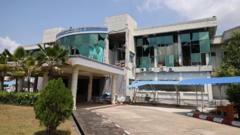Following a 7.7 magnitude earthquake that severely damaged buildings in Nay Pyi Taw, Myanmar's military government plans to redraw the city’s layout, ensuring future structures are built to resist seismic activities as reconstruction efforts commence.
Major Reconstruction Planned for Nay Pyi Taw After Devastating Earthquake

Major Reconstruction Planned for Nay Pyi Taw After Devastating Earthquake
Myanmar's military leadership announces a complete overhaul of its capital city Nay Pyi Taw following significant earthquake damage.
In light of the catastrophic earthquake that struck Myanmar last month, the capital Nay Pyi Taw is set to undergo a significant reconfiguration. Senior General Min Aung Hlaing, the military leader, revealed plans during a government meeting, emphasizing that many of the collapsed buildings were constructed on inadequate soil. He assured the public that new office buildings will adhere to increased earthquake resistance standards, with soil tests being prioritized ahead of any redevelopment.
Reports indicate that nearly 70% of government infrastructure sustained damage, prompting some offices to operate out of Yangon. The earthquake, which hit on March 28 with a magnitude of 7.7, caused widespread havoc, felt as far as Thailand and southwestern China. According to state media, the disaster claimed over 3,500 lives and left more than 5,000 individuals injured.
Nay Pyi Taw, sprawling over an area four times that of London, is a relatively new city, established in 2005 by military leaders who moved the capital 370 kilometers inland from Yangon. Its rationale has often been questioned, with the city's vast roads and grand structures remaining largely unoccupied. Features include extensive boulevards devoid of traffic, lavish malls, and various recreational areas.
Since the military coup in 2021, Myanmar has descended into civil conflict, intensifying the challenges faced by the junta against ethnic militias. Following the earthquake, a 20-day ceasefire was announced by the military council to facilitate humanitarian assistance, although reports suggest ongoing military operations against rebel territories.
The earthquake inflicted severe damage on essential government buildings, including the Ministry of Labour and the Ministry of Planning. Many structures remain in ruins, hampering immediate repair efforts. Reports indicate that valuable government documents have been removed for safety, while departments such as the Ministry of Foreign Affairs are relocating to Yangon and alternative sites in Nay Pyi Taw that provide better structural stability.
Efforts are underway to safeguard precious historical and cultural artifacts at the National Museum in Nay Pyi Taw, as staff work tirelessly to preserve thousands of books and manuscripts from further damage.


















